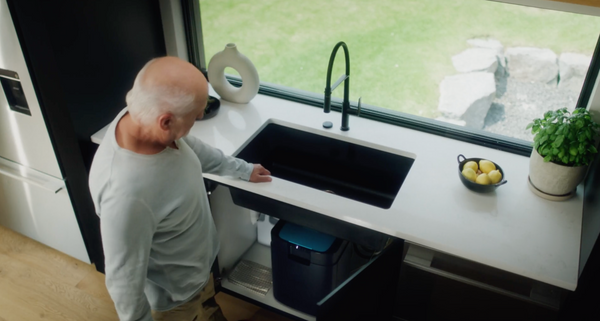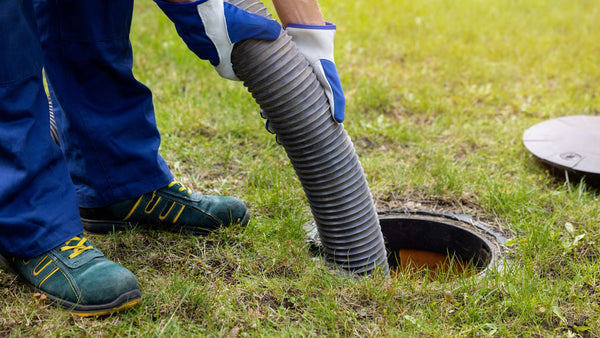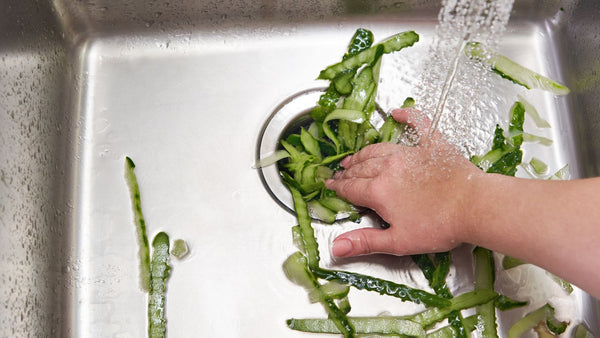If you're considering installing or replacing a garbage disposal in a home with a septic system, it's essential to make an informed decision. This guide will walk you through the considerations, starting with whether you can use a garbage disposal on septic.
Yes, you can use a garbage disposal on a septic system but they can introduce excessive solids into the septic tank, potentially leading to clogs or imbalances in the system. There are septic-friendly alternatives available, such as Sepura, which collects solid food scraps separately, ensuring only liquids enter the septic tank.
Now, let's go over the intricacies of using a garbage disposal on a septic system. We'll cover essential considerations, and maintenance tips to help you make an informed decision for your kitchen setup.
Which Garbage Disposal is Best for a Septic System?

Sepura is the best option for in-sink food disposal on septic systems. All solids are separated from liquid and sent to an odor-proof compost bin, giving you the convenience of a traditional garbage disposal without the septic risks, damage, and excess pumping.
|
Pros
|
Cons
|
|
Only liquid enters your septic, separates food into a compost bin
|
Initial investment cost
|
|
Reduces pumping by up to 50% by stopping food from draining
|
In high demand and can sell out quickly |
|
Makes kitchen cleanup clean, easy, and composting effortless
|
|
|
Odor-proof with air intakes and a carbon filter
|
|
Recommended for: Those seeking an advanced garbage disposal alternative that protects your septic tank and plumbing, simplifies kitchen cleanup, and makes composting convenient.
Learn more about Sepura
Protecting Your Septic System
Choosing the right disposal for a septic system is crucial to ensure the longevity and optimal performance of your septic tank. In this regard, Sepura emerges as the leading solution. Although it isn't a traditional garbage disposal, because no food enters your plumbing or septic tank.
One of the key concerns with traditional garbage disposals is the potential introduction of solid food scraps into the septic tank. This can lead to imbalances in the microbial ecosystem within the tank, causing issues such as excess sludge buildup, reduced bacterial activity, and even potential leach field clogs. These problems can result in costly repairs and a decreased lifespan of the septic system.
Sepura takes a revolutionary approach by effectively diverting solid food scraps away from the septic tank. Instead, it channels them into a specialized compost bin, ensuring that only liquids make their way into the septic system. This separation of solids and liquids is a game-changer for septic systems, as it eliminates the risks associated with traditional garbage disposals.
By keeping solids out of the septic tank, Sepura prevents potential imbalances and complications, ultimately contributing to the overall health and functionality of your septic system. This innovative technology not only safeguards your septic system but also promotes a more sustainable and eco-friendly approach to food waste disposal.

Are Garbage Disposals Bad for Septic Tanks?
The relationship between garbage disposals and septic tanks can be a concern for homeowners. Traditional disposals can overwhelm septic systems by introducing excessive solids, potentially leading to clogs or disrupting the natural bacterial balance essential for proper septic function.
However, the Sepura is specially designed to alleviate these worries. Sepura's septic-friendly technology ensures that only liquids, which septic systems can readily handle, are directed into the tank.
This means that solid food scraps are collected separately in the compost bin, preventing any potential strain on the septic system. With Sepura, you can enjoy the convenience of disposal without compromising the health of your septic system.

How Long Does Waste in Septic Tanks Take to Decompose?
Understanding the decomposition process within a septic tank is essential for its maintenance. Organic waste, like food scraps, generally takes varying amounts of time to break down. In a septic tank, this process can range from several weeks to several months.
The Sepura aids in this process by efficiently collecting solid food scraps in a separate bin. This means that only liquids, which decompose more easily, enter your septic tank. This streamlined process can help maintain a healthier balance within your septic system, ensuring its longevity and effectiveness.
By choosing the Sepura, you're not only opting for convenience but also making a wise investment in the health of your septic system.

Conclusion
When it comes to choosing a garbage disposal for a septic system, the Sepura emerges as an excellent choice. Its septic-friendly design, efficient waste management, and odor-reducing features make it a standout option. By investing in a quality disposal like Sepura, you're not only making life more convenient but also ensuring the longevity and health of your septic system.


